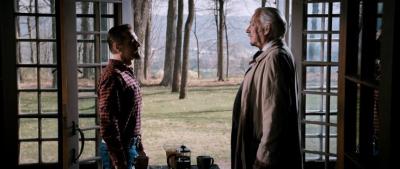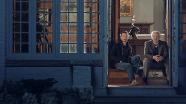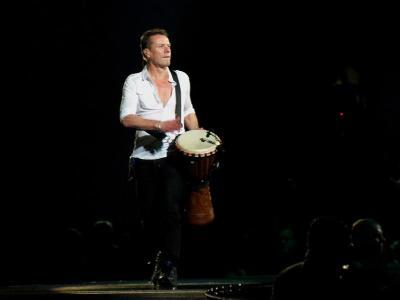By: debbie lynn elias
Larry Mullen, Jr. should be no stranger to anyone. As founder and longtime drummer of U2, he is considered to be one of the Top 50 drummers of all time. Long known for his use of the floor tom to create an almost “tribal” musicality within the U2 music, equally notable is his stylized use of tambourine hits synced to snare drums, adding individualized texture to U2’s distinctive sound, not to mention strutting the stage during live shows carrying a large djembe. Stepping outside his “day job”, Mullen has also ventured into collaborations with other notable recording artists and songwriters, even recording film soundtracks.
But now Mullen takes a real giant step as he segueways into acting with a co-starring role going toe-to-toe opposite Donald Sutherland in the English-language remake of Patrice Leconte’s award-winning French film, MAN ON THE TRAIN. Directed by Mary McGuckian, MAN ON THE TRAIN is a spectacularly profound character study with an amazing performance by not only Sutherland, but Mullen as well, creating a perfect ying and yang between the two. Mullen’s performance belies this as being his acting debut.
As “The Thief”, Mullen arrives in town on the train, intent on robbing a small town bank. Certain that the job will be a piece of cake, things get a bit sticky when he is befriended by a retired poetry professor who welcomes the stranger into his home and his life. A quiet, methodical and exacting man with a defined cadence to his mannerisms, he is the polar opposite of the outgoing and gregarious Professor. Despite or in spite of these differences, the bond that forms between these two men is unshakeable as each gives pause to examining the choices each has made in life and their now dreams of “what if”.
I had a chance to speak with Larry Mullen in this exclusive interview where he talks about his comfort zone, the uncomfortableness of acting, the honor of working with Donald Sutherland and, of course, his music.
Hi Debbie!
Hello, Larry! How are you?
I’m good. How are you?
Fine. How is it over there in beautiful Ireland?
Well, it’s not too cold but it is wet.
As one would expect. [laughing] We’re pretty much in the same boat out here in L.A. right now. It’s been cold and wet.
I’m surprised to hear that.
Doesn’t happen too often. But, we’re not here to talk about the weather. We’re hear to talk about an incredibly wonderful performance that you give in this film, MAN ON THE TRAIN.
Well, thank you very much indeed.
I never would have believed you had not acted in a film before, in a narrative feature.
That’s very kind. It was a challenge as I’m sure you can imagine. It was a challenge. It’s something I had dreamt about maybe doing but never thought I would, first of all, get the opportunity, and second of all, actually do. It was a scary prospect when it started to come together and even more terrifying when I realized that I was going to be standing toe-to-toe with the great Donald Sutherland.
What is it that made you decide to take the next artistic jump from music and go into acting?
I talked about it for a long time and never thought that anything would come of it. It was a fanciful thought, “Yea, this would be something I would like to try because it seems like something so outside of me that it would be standing on the edge of a cliff and jumping down.” And for that reason, I kind of thought, maybe this is what I need to do for myself. I need to do something that challenges everything and puts it all up to me. Having been in a comfort zone for so many years, and I’m not saying for one minute that being a musician and touring and making records is easy, but I was comfortable enough with that challenge. Acting just seemed like something that would be outside of my comfort zone.
So, I had spoken to Mary McGuckian, the director, about my fanciful thought and she handed me a copy of the original Man on the Train and she painted it out [and said], “If ever you decide you want to do that, the transition that Johnny Halladay, the French pop star, the transition that he made is an interesting one. He had been unsuccessful for many years in finding the right film and eventually he ended up working with Patrice Leconte, the director and writer of Man on the Train and it was a very successful union. So we talked. And I saw the film and I loved the original film. Mary went off and got the rights and came back to me and said, “You know that film we spoke about? I actually have the rights. Are you interested in getting involved?” I said, “Yes, I’d love to be involved in production of the film. I think it’s a great film. And maybe there’d be a small acting role for me as well.” And she said, “Yep. No problem.” So, we went down the road and after about a couple of months things started to come together. And Mary said, “Look. You’re going to have to play the role of the man. That’s the whole point of this.” And I reluctantly agreed to do it. Not having any acting experience, it was a pretty long shot. But I decided, I jumped this far, why not go the rest of the distance. And I did. It was an uncomfortable transition and it did not come easy. The production part of it was easier for me. And even doing some of the music, I was more in my comfort zone. The acting itself was difficult.

With you having explained this, what I find really interesting is that your character in the film, when he meets Donald Sutherland’s professor character, is very much at a similar crossroads moving out of his comfort zone much just as you had done taking on this role.
The fact that that happened, hasn’t gone unnoticed and it didn’t go unnoticed by me either. Although acting was an extreme challenge for me and building the character itself, and the script and the way the movie runs, it wasn’t a complete shock.
One thing that’s interesting about your character of “The Thief” as he has been identified, is that everything is very methodical. Your movements are very methodical, very calculated. Your demeanor. That’s very similar to rhythm and method in music. With a rhythmic background, do you find that helped you with the pacing and development once you got in front of the camera?
I think being musical and understanding timing helped. There’s no doubt about that. It’s all the other things that you don’t know about and therein lays some of the problems but also some of the funniest moments [like] when you’re with the great Donald Sutherland and you’re standing in his light because you don’t know the place to stand and I’m meant to be standing somewhere else. So, I did a lot of shuffling from one side of the room to the other to figure out where I should stand. And when I figured that out then I had to get into character and remember the line, and what the line should be. All those things are not where I come from necessarily. With music, there’s the personal endeavor. You are engaged in something that is yours, that’s a part of who you are. Acting is that you’re lying for a living so you don’t have that personal element to it. So not knowing what to do in that environment, not having any frame or framework, allows you to make mistakes, allowed me to make mistakes, and to fail, and also to carry off the character. So, despite my lack of knowledge or craft it turns out that that actually benefitted me in the end.
 Do you see yourself taking on more acting roles? Because as I said, this truly is an incredible performance that you give here.
Do you see yourself taking on more acting roles? Because as I said, this truly is an incredible performance that you give here.
I would dearly love to do more acting, despite the discomfort in having to perform and to open yourself up to this kind of scrutiny. And despite all the discomfort with that, it was an incredibly liberating process and I enjoyed that. I enjoy working with someone as professional and as brilliant as Donald [Sutherland]. And be able to stand there and just watch what he was doing and not understand it. I enjoyed all that. I enjoyed being nervous. I enjoyed that. I enjoyed not being able to rely on anything else except myself. I like that. I’m not sure how that bodes for future acting. A lot of directors like to have actors who can basically rely on the craft. I am too old to go to acting school so I think that kind of limits me a little. But I’d deary love to do it again. Absolutely. And I’d love to do something that would challenge me even more.
You also did the music for the film and the score is absolutely beautiful.
Thank you.
How do you go about scoring a film? You’ve done songs and scores for other films. Do you look at the film? Do you work with the director to get the sense of what the music needs to be?
The original music in the film was what they call “temp score”. We had kind of run out of time looking for someone to come in and write the score properly. We were on the road at the time and I was down in France for part of our [U2] European tour. Mary and I spoke, and I’m the producer, and she was going, “We have to sort the music out. We are running out of time. We’ve only got a few days Simon ” And she mentioned that she was going to a guy called Simon Clime, who is a songwriter and a very very good musician. We were introduced and he played me his stuff. It didn’t work in the film. So, I sat with him for a couple of days and we just thrashed it out. We had a look at the film and because I obviously had a big part in the film and acted in it, I kind of knew where the peaks and troughs were. That’s how we started. We played the film over and over and over again and just wrote this one piece and then took sections from it to put into various different scenes. It’s not something that I had done before either. It was very difficult. And because we were up against the clock, we had time to do one piece of music. Normally in a situation like this you’d have three or four pieces of music to pull from. Again, despite the fact that there’s only one piece of music, I think it fits quite well.
It’s stunning. Did you sit down with Mary [McGuckian] at all and did she give you any input as to the “feel” of the music she wanted or did she leave that to the two of you?
Mary had ideas about what it should be like. And when I was in the position where I had to think that way, I had my own ideas about what it should be like. In fairness to Mary, I think Mary kind of realized that we were running out of time and that there was only one shot, so she stepped out of the way and allowed us to go do it. Now, if she had disliked it, it wouldn’t have gotten into the film. I thought she grew to like it. It wasn’t instant because it wasn’t a song necessarily. It was pieces of music.
What was the most important thing that you learned working with Donald Sutherland?
Good question. Hmmm. It’s a lot to take in. Particularly when you don’t expect that you’re going to be acting with such a professional who’s got so much gravitas in the way he approaches the role and things like that. He is a professional actor and he has craft understanding of the process. He has all those things to rely on. And for me, I had none of those things. So what I learned, as much as I had admired Donald Sutherland, not only his acting prowess, but as a man I admire him very much, what I learned is that I will never get to that stage of being so comfortable that I can just throw myself into the role. It’s always going to be an uncomfortable journey for me. It’s something I came away going, “There are people and there are lots of them who are so brilliant at this and I am so lucky to have had the opportunity to work with them.” I just hope that I don’t get woken up too soon.
Did this film, this experience, change you personally, inherently? Did you take something very personal away from this experience?
If I’m to be absolutely honest, the shooting/producing thing, that in some ways, is the antithesis of who you are. I’m not extroverted. I don’t like to draw attention necessarily to myself. I know that’s bizarre and unbelievable when you think of my day job, but it is the truth. I’m not necessarily comfortable with drawing attention. For me, the personal journey of doing something that lets me be liberated on one level because I never thought that I would get an opportunity to do, but also having to allow myself to be taken by other people. I’m sort of used to running my own show and I’m in a situation where I wasn’t running the show anymore. It had nothing to do with playing a different character. That was a difficult thing to do but also a liberating one. I came away from it going, “I like this. I like what it’s doing to me. It allows me to express myself in a way that I could never do as a professional musician. And part of it was the fear factor. It’s the fear that drives you. In an odd way, the fear is sort of intoxicating.

I would be remiss not to ask you “Anything new on the music front?”
No. We’ve come off a very long tour, a 4 1/2 year jaunt from the beginning of recording our last record to the end of the tour. Everyone’s a little whacked. So everyone’s taking a breather, spending time with their families and just reassessing. We’re in that sort of period of reassessment. We’ll get together early next year and decide where we’re gonna go.
Between the tour, the music and this film, all of which you do masterfully, you deserve a long rest!
Thank you so much, Debbie. I really, really appreciate it. It was so nice to talk to you.
Thank you, Larry!
#












